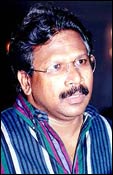 He had two nightmares, confesses Mani Ratnam, arguably one of India's finest directors. The task of shooting a bilingual simultaneously in two languages, with two sets of star casts cannot have been easy.
He had two nightmares, confesses Mani Ratnam, arguably one of India's finest directors. The task of shooting a bilingual simultaneously in two languages, with two sets of star casts cannot have been easy.
Yet, Ratnam seems to have come out none the worse. Like all his movies, under the aegis of his production company Madras Talkies do, Aayitha Ezhuthu (Tamil)/ Yuva (Hindi) have been the subject of much speculation and hype -- as all of Mani Ratnam's films are.
But as Siddharth, one of the leads in the Tamil version says, "We at Madras Talkies believe in keeping our traps shut." And so shut they shall be, about the plotline of this latest offering of Ratnam.
In an extended telephonic interview with Managing Editor Saisuresh Sivaswamy, Ratnam reveals exactly what we should know about the movie. No more. No less. Excerpts:
Be it Roja, Bombay, Dil Se/Uyire or Kannathil Muttamittal, your movies deal with contemporary issues. What issue does Yuva/Aayitha Ezhuthu deal with?
Yuva is contemporary in that it deals with three youngsters, their attitudes. How today's youth, from three different backgrounds, deal with a situation. The film is set against student politics. When you make a film, the bigger picture is to take the heart of the story and managing to convey it on screen. That is the challenge.
Directors normally find it a nightmare to juggle just one cast, and here you have gone made the same movie twice, in Hindi and Tamil. What was your experience?
| |||||||||||
Did you resort to this because in Dil Se/Uyire, the same cast speaking in two different languages did not gel with the audience, and that the north and south have their own sensibilities?
Dil Se was dubbed into Tamil as Uyire. Dubbing a movie brings its own set of compromises, and you end up losing some of the elasticity.
Abhishek Bachchan plays Madhavan's character in the Hindi version. There is a tremendous buzz about him even though box-office success has so far eluded him. What is your take on him?
I am very happy with Abhishek Bachchan. He has played a very interesting character, and the rest you will see for yourself.
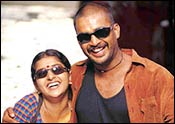 Yuva is a youth film. Although your films are young, two of your previous films -- Thiruda Thiruda and Alai Paayudhey -- also had youth in the centre. Did your experiences with those two movies impact on how you shaped Yuva?
Yuva is a youth film. Although your films are young, two of your previous films -- Thiruda Thiruda and Alai Paayudhey -- also had youth in the centre. Did your experiences with those two movies impact on how you shaped Yuva?
No impact. Once you identify the script and characters are formed, the whole thing just drags you in. There is no baggage. The most important thing is to be honest to this particular script, and not to start off with the intention of making a good film. It depends on the story, and the characters. Each dictates its own rhythm.
The project also earned its share of headlines, what with Vivek Oberoi's accident etc. How was the schedule affected?
That was a most unfortunate thing. Sometimes the most ridiculous things happen and Vivek's accident was one of those. Yes, it did push back the schedule by some three months, but then there is no other choice. It was particularly hard on Vivek.
Yuva is a multi-starrer, which is a sort of break from the past in that this is the first time you have worked with three protagonists.
That is because the script demands three different attitudes. Sometimes films work with just one character, sometimes with more. It all depends on the script, and is built in. I had not done it earlier because the scripts did not require that. There was no specific intention of doing a multi-starrer, it so happened that the story is about three youths. The story decides whether I use new faces or not.
You are also a tech savvy director who constantly pushes the boundaries. You have used sync sound in Yuva. What else is new?
When you do something new, you don't do it in order to do something new but because it is required by the story, because it improves your filmmaking. Sync sound is used now because the story demanded it. These things are done without realising that one is doing something new, because that is not the intention.
Do you have a favourite character among the three protagonists in Yuva/Aayitha Ezhuthu?
I hope not. I hope I have been able to do justice to all three. All three are important aspects to the film, so there is no choosing one over the other. When you see the movie you will be able identify with the characters, not necessarily with just one of them. You will feel at different times, in different circumstances, you are able to identify with all three. That way, each of us has a bit of the characters in us.
The burden of being Mani Ratnam, the pressure of consistently being among India's better directors. How do you handle it?
I ignore it. One knows where one stands, so there is no burden. The only burden is to make the film right, and constantly struggling to make it right. The pressure is enough to not only bring anyone down to earth but also take you a couple of feet under (chuckles).
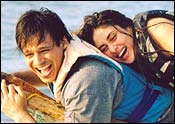 You don't suffer from pre-release jitters?
You don't suffer from pre-release jitters?
The journey of filmmaking is so amazing. You start off with great confidence, and develop insecurity at the time of release. When you are ready with the finished product, you are constantly wondering if you have been honest to the story you started out with, if you got what you wanted. One is too close to the project by
You have said Yuva/Aayitha Ezhuthu is a seed that has germinated with you for some time. How does your creative process work?
Sometimes it is quick and happens fast. Sometimes the seed remains with you for a while, as is invariably the case with me, been with me for two-three films. Unlike in the West where an idea goes into development, with different departments taking over different stages of its development, we work differently here. Sometimes you have not found the writers to develop the script, so it remains with you for a while. After some time it falls into place. Everybody works this way. It is important that you have people around you with the same passion for good films, and have the same flair. That is as important as the story itself.
Actors, and technicians will give their right hand to work with you. Since you can have anyone you want, how do you pick and choose for your movies?
When it comes to casting for movies, it is a priority that you cast right. The guiding principle must be what is right for the movie, that is the basis you cast someone, not because so and so is a friend. It helps to have a wide choice, it makes filmmaking easier. But the priority must be the film, and to be clear about it. Of course, the person you want may not be available, say, then you go for the next best choice.
About Yuva/Aayitha Ezhuthu you have said it is about how three different characters react to the same situation. Do you see a bit of yourself in any of or all the three characters? Is the movie then a vehicle for self-examination?
No, not self-examination. This is true for everybody. Everyone will identify with the characters at different times. About a bit of me in my films, every filmmaker puts a bit of himself in his movies, that's how it is done. Just as every actor puts a bit of himself into every character he plays. In this case it could well be about three different aspects in the same person. When you are in one person's shoes you see things differently, when you are in the other person's shoes you will see it differently yet.
You have also said the kernel is a real-life incident. Do you think you have remained true to the original incident or changed it anyway?
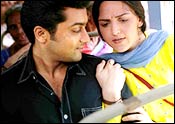
No, it is totally different. That incident I referred to was just the starting point. I have taken the spirit of the person, and this is in no way a real-life drama.
Your films have never used the female character as simply an adornment, rather they have very strongly delineated characters. Your promo material, however, focuses on the male characters?
Wait till you see the film (laughs). I don't use women characters for the sake of using them, this movie calls for very specifically designed characters. They have strong feelings and express them. They are not heroines, they are characters. They all have a mind of their own.
Your wife Suhasini is a talent in her own right, and is an integral part of your filmmaking process. What is her contribution to Yuva/Aayitha Ezhuthu?
She is a critic first. She is the bouncing board for this film. She brings in the objective view, and was involved at the script and the post-production stages. She has the long-distance perspective.
Be it in Roja, Sonu Walia in Dalapathy, Malaika Arora in Dil Se/Uyire, you have used what Bollywood calls 'item number' long before the term became fashionable. Is there one in Yuva?
The songs were not considered 'item numbers' at that point (chuckles). The point is, because I used Sonu Walia from Mumbai it became an item number. Had I used, say, Disco Shanti, it would not be considered an item number.
In Yuva the songs are more an integral part of the story. I had started off saying there will be no songs, and then changed my mind. But when you see the movie you will realise that nothing stands out as a song, but they flow with the story. The music too deals with three different people with three different styles, and is more in tune with the characters.
A R Rahman has said working with you is a two-way give and take. Music is a strong element of your movie-making, and it has a tremendous Tamil idiom. What is the extent of your involvement with Rahman's music?
I don't make, but merely choose, the music. I get to tell Rahman, sometimes push him to what I want, but finally it is up to him to deliver. Rahman is very very director friendly. He is ever ready to go whichever the director wants, the story wants, depending on the kind of movie or the music you want, and within that he finds his niche. It is a constantly complementary process. At the end of the day he is not pleasing you, he has to please himself.
Nayagan was the only movie you and Kamal Haasan, the two powerhouses from Tamil films, worked together. It has been a long time. Are movie buffs to be denied a chance to see you together?
I don't know. Kamal Haasan is a huge talent. We need to have something to offer like Nayagan, we need to cross that benchmark, or at least go up to it. We are not merely doing a project, that is very easy, but we need to something good. As of this moment we have not hit on anything.
From the Western perspective, Bollywood has become an all-encompassing term for Indian cinema. It does not justice to talent like you who are out of the Mumbai film industry, or to the Malayalam and Bengali industries. Does it irk you?
The name itself. Calling yourself after something that rhymes with Hollywood is, well, sad. Obviously they are doing it to identify Indian films, but that is a classification one can grow out of. As long as you are making the kind of films you are happy about, it is okay. One is not in competition with Hindi films.
Making films appealing to the NRI sensibility is the trend now, but Tamil films seem to stay out of it. Do you see yourself making an NRI film?
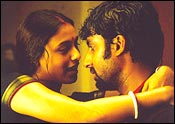 My focus is on the script, and the characters are rooted here. I don't think it is easy within the script to take them over there and bring them back. I have to be honest to the story I have. If the story is based over there, I will have no problems doing it, but not with this story.
My focus is on the script, and the characters are rooted here. I don't think it is easy within the script to take them over there and bring them back. I have to be honest to the story I have. If the story is based over there, I will have no problems doing it, but not with this story.
Your films are rooted in the local idiom and have done well for that reason. Dil Se/Uyire was one movie that failed to connect at that level. With the 20:20 vision of hindsight, what could you have done differently?
I don't know. When you make a movie for a year-and-a-half, obviously you are convinced that it is right. Yes, the film didn't do commercially well. Yes, I made a mistake, but that doesn't mean the one-and-a-half years were a lie. It was intended to be right, but some elements didn't work. There could be a few faults, I was aware of them at that time, but despite it I thought we will be able to make the film work. It was confidence.
But, then, you get on.
Among all your movies, do you have a favourite, one that you can look at and say, 'yes, this was it'?
No. Probably the next one.
(Parts of this interview first appeared in India Abroad)





